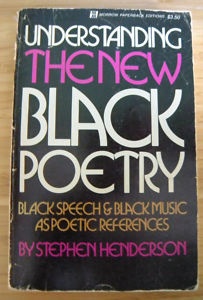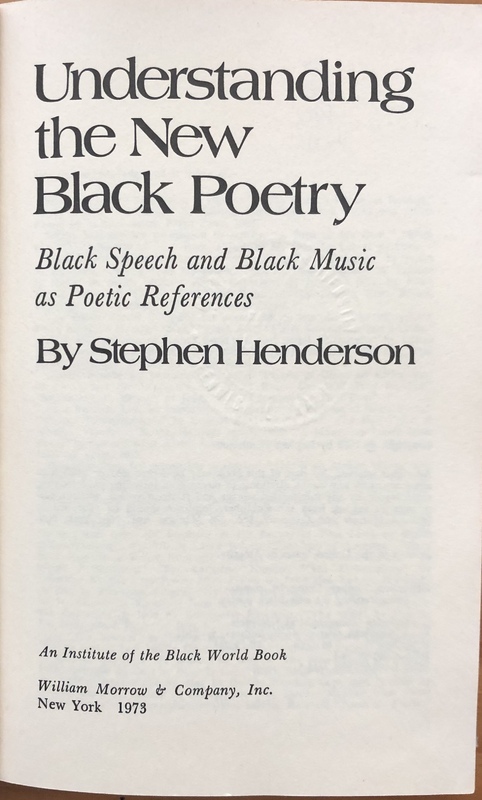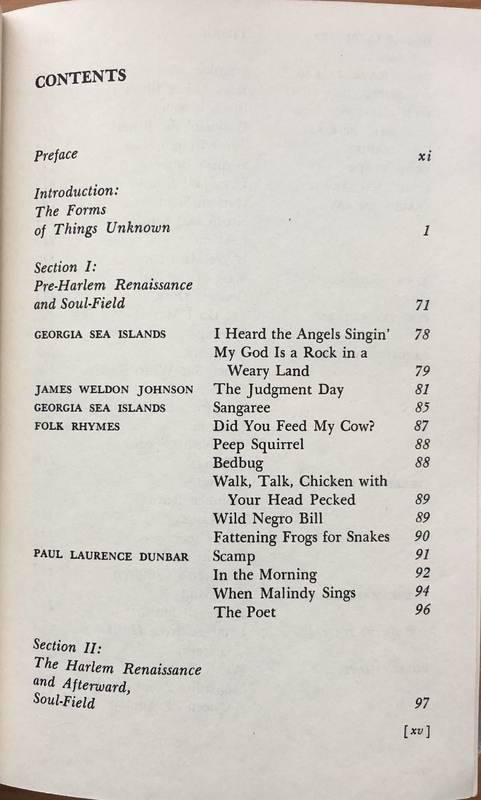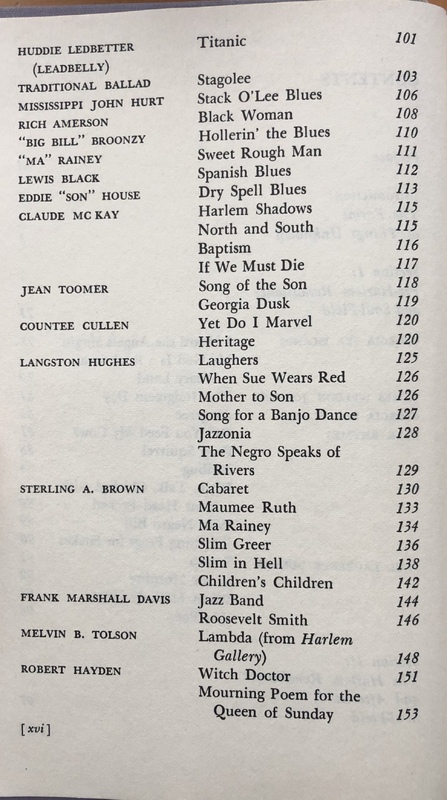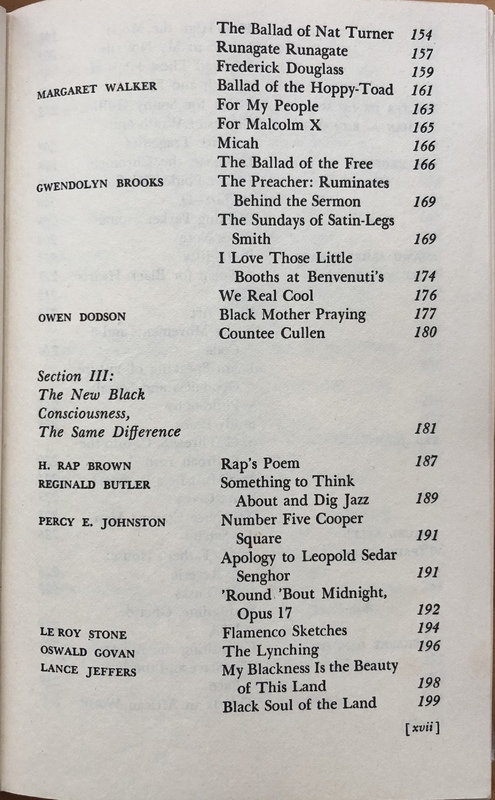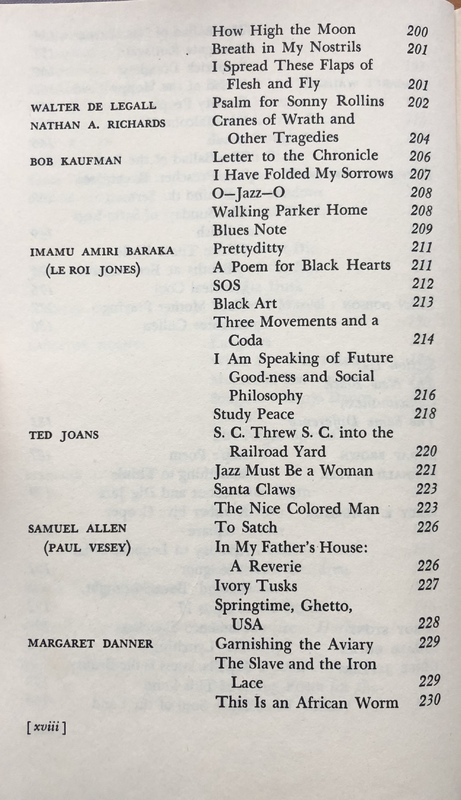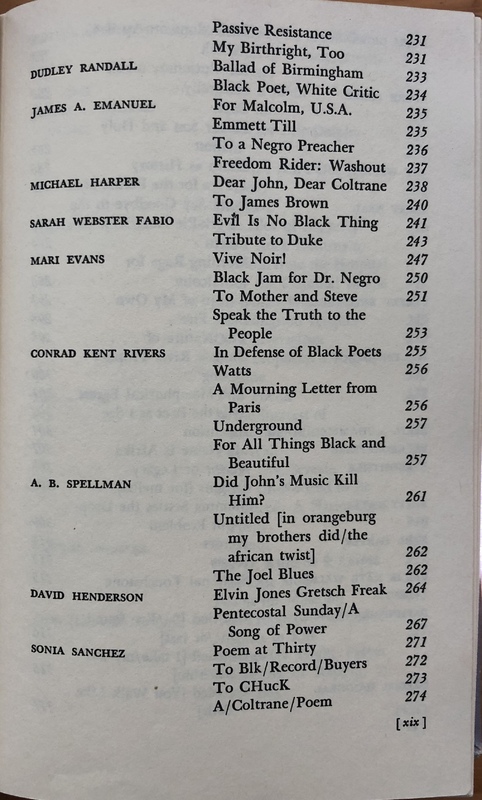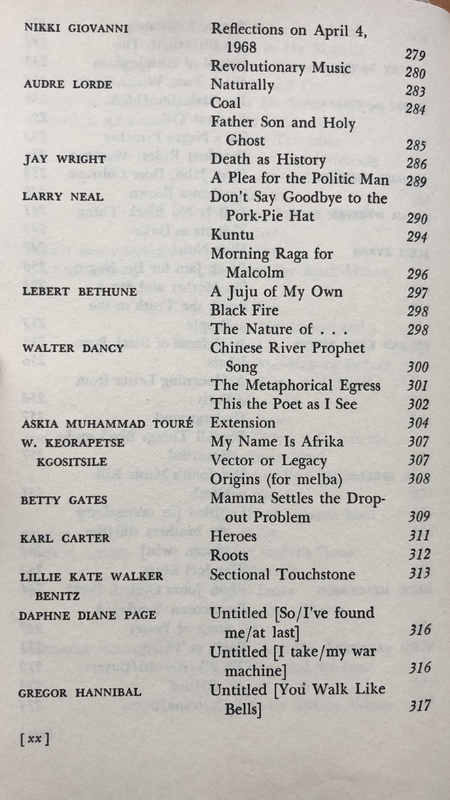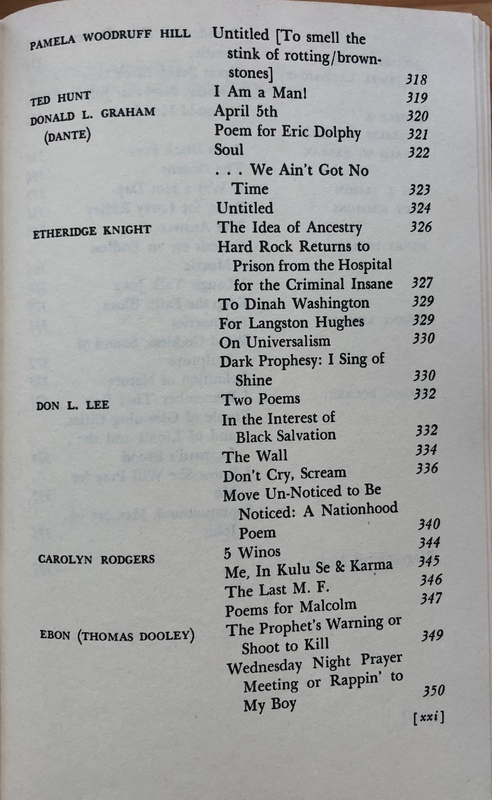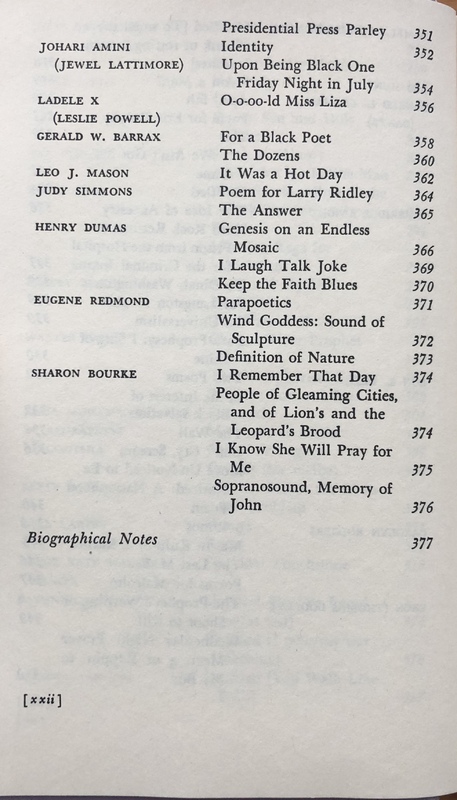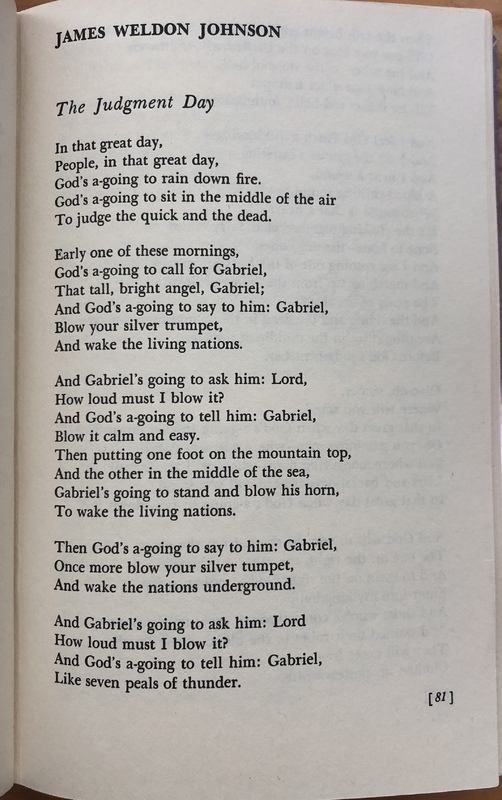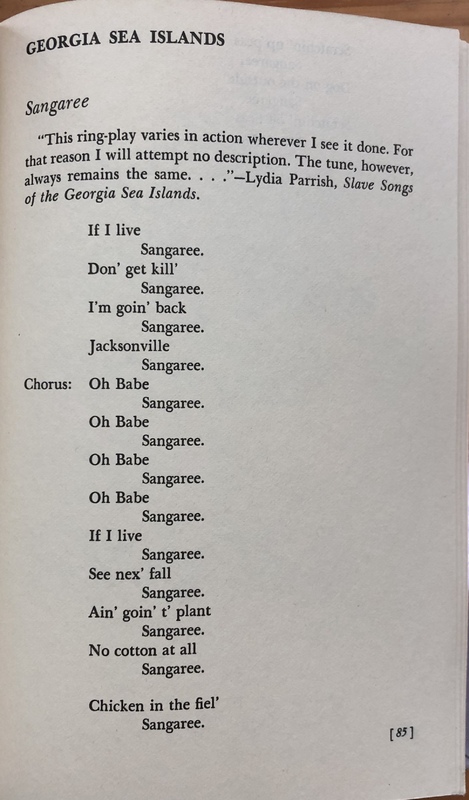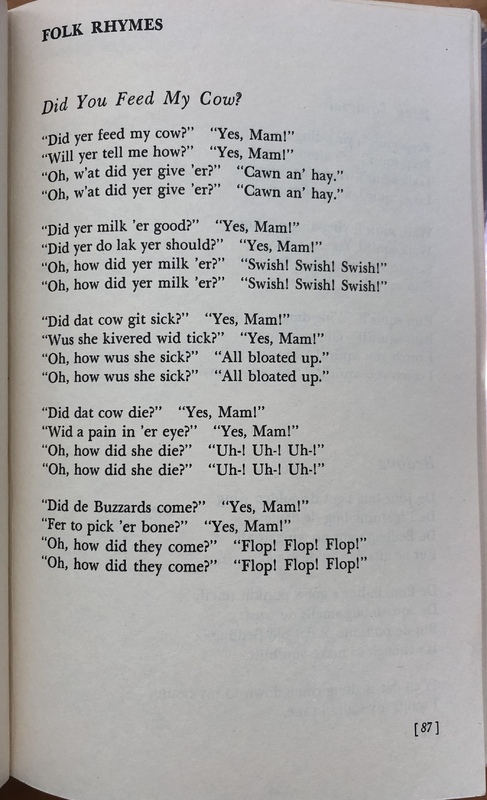-
Title
-
Understanding the New Black Poetry: Black Speech and Black Music as Poetic References
-
This edition
-
"Understanding the New Black Poetry: Black Speech and Black Music as Poetic References." Ed. Stephen Evangelist Henderson. New York: Morrow, 1973. xxii+394 pp.
-
Table of contents
-
● S.E.H. (Stephen Henderson) / Preface
● S.E.H. (Stephen Henderson) / Introduction: The Forms of Things Unknown
Section I: Pre-Harlem Renaissance and Soul-Field
● Georgia Sea Islands / I Heard the Angels Singin’
● Georgia Sea Islands / My God Is a Rock in a Weary Land
● James Weldon Johnson / The Judgement Day
● Georgia Sea Islands / Sangaree
● Anon. / Folk Rhymes: Did You Feed My Cow?
● Anon. / Folk Rhymes: Peep Squirrel
● Anon. / Folk Rhymes: Bedbug
● Anon. / Folk Rhymes: Walk, Talk, Chicken with Your Head Pecked
● Anon. / Folk Rhymes: Wild Ngro Bill
● Anon. / Folk Rhymes: Fattening Frogs for Snakes
● Paul Laurence Dunbar / Scamp
● Paul Laurence Dunbar / In the Morning
● Paul Laurence Dunbar / When Malindy Sings
● Paul Laurence Dunbar / The Poet
Section II: The Harlem Renaissance and Afterward, Soul-Field
● Huddie Ledbetter (Leadbelly) / Titantic
● Anon. / Traditional Ballad: Stagolee
● Mississippi John Hurt / Stack O’Lee Blues
● Rich Amerson / Black Woman
● “Big Bill” Broonzy / Hollerin’ the Blues
● “Ma” Rainey / Sweet Rough Man
● Lewis Black / Spanish Blues
● Eddie “Son” House / Dry Spell Blues
● Claude McKay / Harlem Shadows
● Claude McKay / North and South
● Claude McKay / Baptism
● Claude McKay / If We Must Die
● Jean Toomer / Song of the Son
● Jean Toomer / Georgia Dusk
● Countee Cullen / Yet Do I Marvel
● Countee Cullen / Heritage
● Langston Hughes / Laughers
● Langston Hughes / When Sue Wears Red
● Langston Hughes / Mother to Son
● Langston Hughes / Song for a Banjo Dance
● Langston Hughes / Jazzonia
● Langston Hughes / The Negro Speaks of Rivers
● Sterling A. Brown / Cabaret
● Sterling A. Brown / Maumee Ruth
● Sterling A. Brown / Ma Rainey
● Sterling A. Brown / Slim Greer
● Sterling A. Brown / Slim in Hell
● Sterling A. Brown / Children’s Children
● Frank Marshall Davis / Jazz Band
● Frank Marshall Davis / Roosevelt Smith
● Melvin B. Tolson / Lambda (from “Harlem Gallery”)
● Robert Hayden / Witch Doctor
● Robert Hayden / Mourning Poem for the Queen of Sunday
● Robert Hayden / The Ballad of Nat Turner
● Robert Hayden / Runagate Runagate
● Robert Hayden / Frederick Douglass
● Margaret Walker / Ballad of the Hoppy-Toad
● Margaret Walker / For My People
● Margaret Walker / For Malcolm X
● Margaret Walker / Micah
● Margaret Walker / The Ballad of the Free
● Gwendolyn Brooks / The Preacher: Ruminates Behind the Sermon
● Gwendolyn Brooks / The Sundays of Satin-Legs Smith
● Gwendolyn Brooks / I Love Those Little Booths at Benvenuti’s
● Gwendolyn Brooks / We Real Cool
● Owen Dodson / Black Mother Praying
● Owen Dodson / Countee Cullen
Section III: The New Black Consciousness, The Same Difference
● H. Rap Brown / Rap’s Poem
● Reginald Butler / Something to Think About and Dig Jazz
● Percy E. Johnston / Number Five Cooper Square
● Percy E. Johnston / Apology to Leopold Sedar Senghor
● Percy E. Johnson / ‘Round ‘Bout Midnight, Opus 17
● Le Roy Stone / Flamenco Sketches
● Oswald Govan / The Lynching
● Lance Jeffers / My Blackness Is the Beauty of This Land
● Lance Jeffers / Black Soul of the Land
● Lance Jeffers / How High the Moon
● Lance Jeffers / Breath in My Nostrils
● Lance Jeffers / I Spread These Flaps of Flesh and Fly
● Walter De Legall / Psalm for Sonny Rollins
● Nathan A. Richards / Cranes of Wrath and Other Tragedies
● Bob Kaufman / Letter to the Chronicle
● Bob Kaufman / I Have Folded My Sorrows
● Bob Kaufman / O—Jazz—O
● Bob Kaufman / Walking Parker Home
● Bob Kaufman / Blues Note
● Imamu Amiri Baraka (Le Roi Jones) / Prettyditty
● Imamu Amiri Baraka (Le Roi Jones) / A Poem for Black Hearts
● Imamu Amiri Baraka (Le Roi Jones) / SOS
● Imamu Amiri Baraka (Le Roi Jones) / Black Art
● Imamu Amiri Baraka (Le Roi Jones) / Three Movements and a Coda
● Imamu Amiri Baraka (Le Roi Jones) / I Am Speaking of Future Good-ness and Social Philosophy
● Imamu Amiri Baraka (Le Roi Jones) / Study Peace
● Ted Joans / S.C. Threw S.C. into the Railroad Yard
● Ted Joans / Jazz Must Be a Woman
● Ted Joans / Santa Claws
● Ted Joans / The Nice Colored Man
● Samuel Allen (Paul Vesey) / To Satch
● Samuel Allen (Paul Vesey) / In My Father’s House: A Reverie
● Samuel Allen (Paul Vesey) / Ivory Tusks
● Samuel Allen (Paul Vesey) / Springtime, Ghetto, USA
● Margaret Danner / Garnishing the Aviary
● Margaret Danner / The Slave and the Iron Lace
● Margaret Danner / This Is an African Worm
● Margaret Danner / Passive Resistance
● Margaret Danner / My Birthright, Too
● Dudley Randall / Ballad of Birmingham
● Dudley Randall / Black Poet, White Critic
● James A. Emanuel / For Malcolm, U.S.A.
● James A. Emanuel / Emmett Till
● James A. Emanuel / To a Negro Preacher
● James A. Emanuel / Freedom Rider: Washout
● Michael Harper / Dear John, Dear Coltrane
● Michael Harper / To James Brown
● Sarah Webster Fabio / Evil Is No Black Thing
● Sarah Webster Fabio / Tribute to Duke
● Mari Evans / Vive Noir!
● Mari Evans / Black Jam for Dr. Negro
● Mari Evans / To Mother and Steve
● Mari Evans / Speak the Truth to the People
● Conrad Kent Rivers / In Defense of Black Poets
● Conrad Kent Rivers / Watts
● Conrad Kent Rivers / A Mourning Letter from Paris
● Conrad Kent Rivers / Underground
● Conrad Kent Rivers / For All Things Black and Beautiful
● A. B. Spellman / Did John’s Music Kill Him?
● A. B. Spellman / Untitled [in orangeburg my brothers did/the african twist]
● A. B. Spellman / The Joel Blues
● David Henderson / Elvin Jones Gretsch Freak
● David Henderson / Pentecostal Sunday/A Song of Power
● Sonia Sanchez / Poem at Thirty
● Sonia Sanchez / To Blk/Record/Buyers
● Sonia Sanchez / To CHucK
● Sonia Sanchez / A/Coltrane/Poem
● Nikki Giovanni / Reflections on April 4, 1968
● Nikki Giovanni / Revolutionary Music
● Audre Lorde / Naturally
● Audre Lorde / Coal
● Audre Lorde / Father Son and Holy Ghost
● Jay Wright / Death as History
● Jay Wright / A Plea for the Politic Man
● Larry Neal / Don’t Say Goodbye to the Pork-Pie Hat
● Larry Neal / Kuntu
● Larry Neal / Morning Raga for Malcolm
● Lebert Bethune / A Juju of My Own
● Lebert Bethune / Black Fire
● Lebert Bethune / The Nature of . . .
● Walter Dancy / Chinese River Prophet Song
● Walter Dancy / The Metaphorical Egress
● Walter Dancy / This the Poet as I See
● Askia Muhammad Touré / Extension
● W. Keorapetse Kgositsile / My Name Is Afrika
● W. Keorapetse Kgositsile / Vector or Legacy
● W. Keorapetse Kgositsile / Origins (for melba)
● Betty Gates / Mamma Settles the Drop-out Problem
● Karl Carter / Heroes
● Karl Carter / Roots
● Lillie Kate Walker Benitz / Sectional Touchstone
● Daphne Diane Page / Untitled [So/I’ve found me/at last]
● Daphne Diane Page / Untitled [I take/my war machine]
● Gregor Hannibal / Untitled [You Walk Like Bells]
● Pamela Woodruff Hill / Untitled [To smell the stink of rotting/brown-stones]
● Ted Hunt / I Am a Man!
● Donald L. Graham (Dante) / April 5th
● Donald L. Graham (Dante) / Poem for Eric Dolphy
● Donald L. Graham (Dante) / Soul
● Donald L. Graham (Dante) / . . . We Ain’t Got No Time
● Donald L. Graham (Dante) / Untitled
● Etheridge Knight / The Idea of Ancestry
● Etheridge Knight / Hard Rock Returns to Prison from the Hospital for the Criminal Insane
● Etheridge Knight / To Dinah Washington
● Etheridge Knight / For Langston Hughes
● Etheridge Knight / On Universalism
● Etheridge Knight / Dark Prophesy: I Sing of Shine
● Don L. Lee / Two Poems
● Don L. Lee / In the Interest of Black Salvation
● Don L. Lee / The Wall
● Don L. Lee / Don’t Cry, Scream
● Don L. Lee / Move Un-Noticed to Be Noticed: A Nationhood Poem
● Carolyn Rodgers / 5 Winos
● Carolyn Rodgers / Me, In Kulu Se & Karma
● Carolyn Rodgers / The Last M. F.
● Carolyn Rodgers / Poems for Malcolm
● Ebon (Thomas Dooley) / The Prophet’s Warning or Shoot to Kill
● Ebon (Thomas Dooley) / Wednesday Night Prayer Meeting or Rappin’ to My Boy
● Ebon (Thomas Dooley) / Presidential Press Parley
● Johari Amini (Jewel Lattimore) / Identity
● Johari Amini (Jewel Lattimore) / Upon Being Black One Fright Night in July
● Ladele X (Leslie Powell) / O-o-oo-ld Miss Liza
● Gerald W. Barrax / For a Black Poet
● Gerald W. Barrax / The Dozens
● Leo J. Mason / It Was a Hot Day
● Judy Simmons / Poem for Larry Ridley
● Judy Simmons / The Answer
● Henry Dumas / Genesis on an Endless Mosaic
● Henry Dumas / I Laugh Talk Joke
● Henry Dumas / Keep the Faith Blues
● Eugene Redmond / Parapoetics
● Eugene Redmond / Wind Goddess: Sound of Sculpture
● Eugene Redmond / Definition of Nature
● Sharon Bourke / I Remember That Day
● Sharon Bourke / People of Gleaming Cities, and of Lion’s and the Leopard’s Brood
● Sharon Bourke / I Know She Will Pray for Me
● Sharon Bourke / Sopranosound, Memory of John
● Biographical Notes
-
About the anthology
-
• "Along with his 70-page introduction, Henderson offers a brief opening statement to each section of the anthology" (Rambsy 2004: 190). Henderson's introduction offers a poetics of African American poetry: for example, Henderson "identifies at least ten ways that Black music informs African American poetry. The methods that poets utilize to draw on Black music include the use of: generalized references to songs, song titles, quotations from songs, adaptations of song forms, tonal memories as poetic structure, musical notations in texts, emotional responses [to music or songs?] incorporated into poems, musician as subject/poem/history/myth, language from jazz life, poems as musical score or chart. To support his points for the ten methods, Henderson offer[s] examples from the poems included in his anthology for each of the categories (46-61)" (Rambsy 2004: 191).
-
Reviews and notices of anthology
-
• n/a
-
Commentary on anthology
-
• "Oral tradition, both rural and urban, forms an infrastructure for this anthology, which presents selections of black poetry with an emphasis on the poetry of the sixties. Based on the thesis that the new black poetry's main referents are black speech and black music, the anthology includes examples from the oral tradition of folk sermon, spirituals, blues, ballad, and rap. An extensive introduction explores the many forms used by black poets, with comments on what is black in the poetry in terms not only of theme and fidelity to the black experience in America, but in terms of structure as well. Biographical notes on the contributing poets are appended to the anthology. (MF)" (ERIC http://eric.ed.gov/?id=ED079744 )
• "Henderson's extended introduction as well as the number and range of poets and writings that he included in his anthology helped make "Understanding the New Black Poetry" a defining and widely read Black arts text. Although the anthology is a trade publication, Henderson spent a great deal of time in his introduction theorizing and detailing the operations of the New Black Poetry. Rather than limit his discussion to only those poems composed during the 1960s and early 1970s, however, Henderson made connections between the New Black Poetry and earlier traditions of African American poetry. He also discussed verbal forms such as blues lyrics, folk poetry, and street poetry in order to suggest the '"continuity" and the "wholeness" of the Black Poetic tradition in the United States'" (Rambsy 2004: 188)
• "the poets included in the third section ["The New Black Consciousness, The Same Difference"] comprise a diverse group of writers, but Henderson purposely downplays the differences among the poets in order to emphasize the point that 'despite its variety the poetry of the sixties is informed and unified by the new consciousness of Blackness' (183). . . . // Rather than offer a precise and inevitably limiting definition, Henderson illustrates his view of the new consciousness of Blackness by presenting a range of selections to readers" (Rambsy 2004: 190-91).
• "In an effort to showcase the '"continuity" and the "wholeness" of the Black Poetic tradition in the United States,' Stephen Henderson (1925-97) . . . presented one of the most dynamic gatherings of African American poetry across generations. Henderson arranged his anthology into three sections. Section I, 'Pre-Harlem Renaissance and Soul-Field,' . . . Section II, 'The Harlem Renaissance and Afterward, Soul-Field,' . . . [and Section III,] 'The New Black Consciousness, the Same Difference' . . . By highlighting the relationship of the poems to African American speech patterns and musical practices, Henderson was, in effect, illustrating the extent to which black aesthetics could be used to assemble a diverse group of writers in a centralized context" (James Smethurst and Howard Rambsy II. "Reform and Revolution, 1965-1976: The Black Aesthetic at Work." "The Cambridge History of African American Literature". Ed. Maryemma Graham and Jerry W. Ward, Jr. Cambridge: Cambridge UP, 2011. 412).
• "Among the early products of [the Institute of the Black World in Atlanta] was Stephen Henderson's anthology "Understanding the New Black Poetry", which provided a critical apparatus, including such notions as the 'saturation' of blackness and 'mascons,' or massively concentrated images or tropes of black experience, that still influences the criticism of African American literature today" (Smethurst & Rambsy 2011: 448).
-
See also
-
• Rambsy, Harold. "Understanding the 'New' African American Anthologies." In "The New Black Poetry: Its Origins, Poetics, Technical Production, and Criticism." Diss. Pennsylvania State University, 2004. 176-92.
-
Cited in
-
• [not in Kinnamon 1997]
-
Item Number
-
A0192
